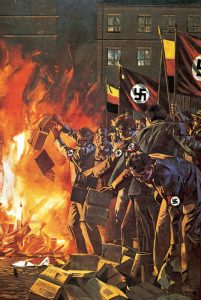
I do apologize, I should have made this type of post sooner. Initially, I came into this class trying to have an objective view on censorship, though I did not know much of censorship, aside a festive week that Oklahoma City Community College put on called banned books week. I had assumed that the library was trying to bring light to the evolution of free speech throughout the world, due to many of the flyers showed older classics being banned, and if I recall correctly it the latest book being C.S. Lewis’ Chronicle of Narnia: the lion, the witch, and the Wardrobe. After the first few class session, I believed that no book should be censored, that an individual should be able to read whatever he or she wanted to, then be able to form their own opinion. However, I recently watched a documentary that altered my stance. The American Anarchist is a documentary that interviews William Powell, the author, of An Anarchist’s Cookbook almost fifty years after his controversial publication, as well as gives a brief synopsis of his work. An Anarchist’s Cookbook has inspired many domestic acts of terror, the most notable being Timothy McVeigh. He was partly-inspired by the work in the bombing of the Murrah Federal Building in Oklahoma City, Oklahoma in the 1900s. It was this documentary as well as reflection on the recent rise in domestic terror attacks, mainly public shootings, that has altered my view on censorship. While freedom of speech is an unalienable human right, there is a line, persay, that should not be crossed, for if works like the An Anarchist’s Cookbook. If it was not published how many individuals would not have been radicalized by such a work? While in a perfect world there should be no censorship, any idea that could be put to paper should be published, however, we do not live in such an optimistic place. Knowledge is like a fire, those not careful will get burned.
However, aside from books such as An Anarchist’s Cookbook, I do not be censored or challenged. Especially, if the book is banned for such issues, as parents wanting a book banned, despite the child showing interest in the book. In doing so by banning such books, the parent only makes the book more popular and read, due to then the act of rebellion in reading such controversial books. If parties were insistent on banning, perhaps instead of banning, there should be a system similar to the video game industry, books should be rated by age group. Whereas books like the Chronicles of Narnia: the Lion, the Witch, and the Wardrobe could be offered to all age groups, while the Kite Runner would not be able to be purchased without a parent unless the individual is old enough to buy it.
